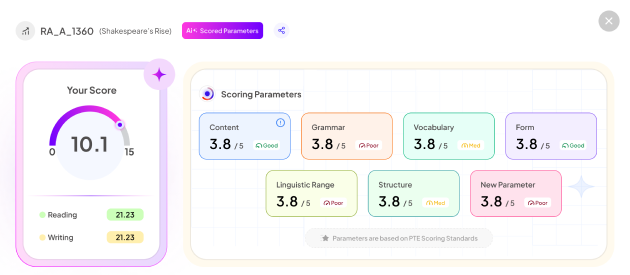New Zealand is a land of breathtaking landscapes, vibrant culture, and excellent opportunities for skilled professionals. If you’re considering applying for a New Zealand work visa, meeting the English language proficiency requirements is crucial. One popular way to demonstrate your proficiency is through the Pearson Test of English (PTE). In this blog, we will explore the requirement PTE score for New Zealand work visa categories and provide tips to achieve your desired score.
Know PTE Score for New Zealand Work Visa
New Zealand offers a variety of work visas for individuals looking to live and work in the country. Below are the main types of work visas and their associated PTE (Pearson Test of English) score requirements:
Accredited Employer Work Visa (AEWV):
- Target Audience: This visa is for individuals who have a job offer from an accredited employer in New Zealand.
- English Requirement for Skill Levels 4 & 5 Roles:
- Minimum PTE Academic score required: 29 (out of 90)
- This score is considered low, reflecting the need for basic English proficiency.
- The PTE test results must be obtained within two years prior to applying.
- This visa is typically for positions that require lower skill levels, such as those in hospitality or retail.
Skilled Migrant Category Resident Visa:
- Target Audience: This visa is for skilled workers who want to live and work in New Zealand permanently.
- English Requirement for Principal Applicants (Skilled Workers):
- Minimum PTE Academic score required: 58 (out of 90)
- This score represents a moderate level of English proficiency, sufficient for most professional roles.
- Applicants with a higher score are more likely to earn more points in the visa selection process.
- English Requirement for Partners or Dependent Children (aged 16+):
- Minimum PTE Academic score required: 36 (out of 90)
- This score reflects a lower proficiency level compared to the principal applicant but still ensures basic communication skills.
Start your free PTE mock test with Gurully and get AI-powered analysis for a personalized journey.


- Kickstart your PTE prep with a free AI-scored mock test
- Boost your score with in-depth analysis & smart recommendations
Other Work Visas:
- Employees of Relocating Business Resident Visa:
- Minimum PTE Academic score required: 29 (out of 90)
- For individuals relocating with their employer to New Zealand.
- Entrepreneur Work Visa:
- Minimum PTE Academic score required: 29 (out of 90)
- For individuals planning to start or invest in a business in New Zealand.
Both of these visas require basic English proficiency, and the PTE score requirement reflects that lower skill levels are needed for these types of roles.
Note: Always refer to the latest updates from the Immigration New Zealand website or consult an immigration advisor for precise requirements.
PTE Score Requirement For Other New Zealand Visas
| Visa Type | Minimum PTE Academic Score |
| Religious workers, and partners and dependent children of Residence from Work applicants | 36 or more |
| Dependent Child Resident visa | 36 or more |
|
Parent Resident visa |
29 or more in at least two of the four skills (Listening, Reading, Writing and Speaking)
Or An overall score of 36 or more |
| Entrepreneur and Employees of Relocating Businesses categories | 29 or more |
| China Working Holiday visa | 42 or more |
| Working Holiday visa applicants from the Philippines, Thailand, Turkey, and Vietnam | 30 or more |
| Peru Working Holiday visa | 36 or more in Speaking and one other skill area (Listening, Reading, Writing) |
| Global Impact Work visa | 58 or more |
Understand PTE Academic Exam For New Zeland Work Visa
The Pearson Test of English (PTE) Academic is a computer-based assessment that evaluates English language proficiency across four key skills: speaking, writing, reading, and listening. Designed to simulate real-life academic scenarios, the PTE assesses your ability to communicate effectively in an English-speaking environment.
Test Format and Structure: The PTE Academic exam is divided into three sections:
- Speaking and Writing: This section combines tasks that assess both your spoken and written English. You’ll encounter a variety of question types, including read-aloud, repeat sentences, describe images, retelling lectures, answering short questions, summarizing written text, and writing essays.
- Reading: This section focuses on your ability to understand written English. You’ll encounter tasks such as fill in the blanks, multiple-choice questions, reorder paragraphs, and summarize written text.
- Listening: This section assesses your ability to comprehend spoken English. You’ll listen to audio or video clips and answer questions in various formats, including multiple-choice, fill in the blanks, and summarizing spoken text.
Scoring Criteria: PTE Academic scores range from 10 to 90, with each of the four skills contributing to your overall score. A higher score indicates a stronger proficiency in English.
Advantages of PTE over Other English Language Tests:
- Speed: PTE results are typically available within five business days.
- Efficiency: The computer-based format and integrated scoring system streamline the testing process.
- Global Acceptance: PTE is recognized by a wide range of universities, institutions, and government agencies worldwide.
- Fairness: The test uses advanced technology to ensure accurate and unbiased scoring.
By understanding the PTE Academic format and its advantages, you can effectively prepare for the exam and maximize your chances of achieving a high score.
PTE Score Requirements for New Zealand University
Besides knowing the PTE Score for New Zealand Work Visa, you must also know the score requirement for universities. While general guidelines exist, it’s essential to remember that specific requirements can vary based on the institution or visa category.
Minimum PTE Scores for Universities
While the minimum PTE score can fluctuate, here’s a general overview:
| Undergraduate Programs: | Typically require an overall score between 50 and 64. |
| Postgraduate Programs: | Often demand a higher score, ranging from 58 to 79. |
Note: These are estimates, and individual universities may have more stringent requirements.
PTE Score Requirements for Popular Universities
To provide a clearer picture, here are the PTE score expectations for some renowned New Zealand universities:
| Universities | Undergraduate | Postgraduate |
| University of Auckland | 58-64 | 64-90 |
| University of Otago | 56-65 | 65-90 |
| Victoria University of Wellington | 58-64 | 64-90 |
| University of Canterbury | 58-64 | 64-90 |
| Auckland University of Technology (AUT) | 58-65 | 65-90 |
Preparing for the PTE Exam
Achieving a competitive PTE score requires dedicated preparation. Here are some effective strategies to enhance your performance:
Effective Study Strategies and Tips
- Understand the Test Format: Familiarize yourself with the PTE exam structure, question types, and time allotted for each section.
- Build a Strong Vocabulary: Expand your vocabulary through reading, listening, and practice exercises.
- Develop Grammar Proficiency: Focus on grammar rules and usage to improve your writing and speaking accuracy.
- Practice Regularly: Consistent practice is key to success. Dedicate ample time to each section of the test.
- Time Management: Develop effective time management skills to complete the test within the allotted time.
Importance of Practice Tests
Practice tests are invaluable tools for PTE preparation. They help you:
- Familiarize yourself with the exam format: Understand the question types and time constraints.
- Identify strengths and weaknesses: Focus on areas where you need improvement.
- Build exam confidence: Regular practice can boost your confidence on test day.
- Improve time management: Practice completing the test within the given time frame.
Gurully PTE Exam Practice offers a comprehensive platform for PTE preparation, providing mock tests, question-wise and section-wise practice. You can also practice on the go with the PTE practice mobile application available to download for both Android and iOS. You also get a comprehensive feedback with AI-scoring to help you achieve your desired score.
Conclusion
meeting the requirement of PTE score for New Zealand work visa is a crucial step in the application process for individuals seeking to work in New Zealand. Different visa categories have varying PTE score requirements, ranging from basic proficiency for lower-skilled roles to higher levels for skilled positions. Understanding these specific requirements and preparing effectively is key to a successful application. By dedicating time to practice and using resources like PTE Mock Tests and study plans, you can achieve the score you need. Staying informed and well-prepared ensures you’re ready to seize the opportunity to live and work in New Zealand.
FAQs
Can I use my PTE score for both study and work visas in New Zealand?
What is the validity period of a PTE score?
Can I retake the PTE exam if I am not satisfied with my score?
Are there any specific PTE score requirements for different visa categories in New Zealand?
How long does it take to get PTE results?
Also Read:
- PTE Summarize Written Text Template With Predictive Questions & Answers to Score High
- PTE Write From Dictation Tips & Tricks to Score Higher
- PTE Essay Writing Template – Ace Your PTE Academic Exam!!
Free PTE Practice Test





